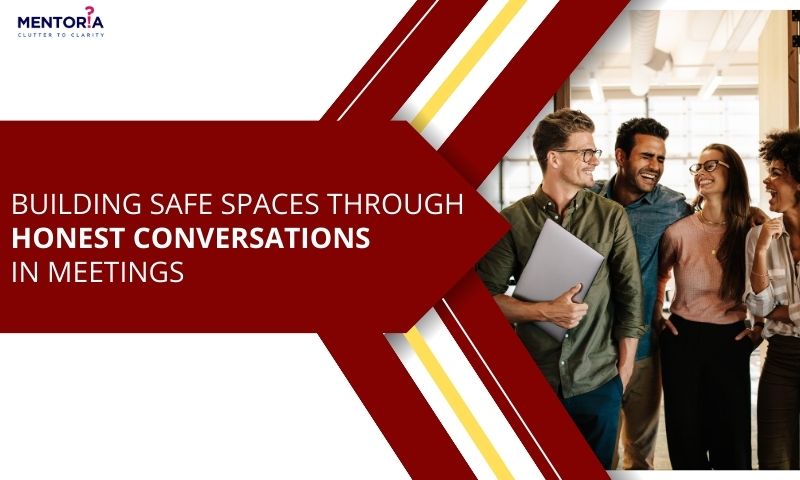Building Safe Spaces Through Honest Conversations in Meetings

Creating a safe space for tough conversations is no easy feat. It doesn’t matter where or with whom you’re trying to have these discussions; there’s an inherent fear attached to them. They feel threatening, unsafe, and often force us to confront uncomfortable truths about ourselves.
Unfortunately, many of these crucial conversations end up on the back burner, unheard and unresolved. As a result, needs remain unaddressed, leading to a growing divide in our relationships and teams. We choose our own comfort over genuine connection, leaving untapped potential and collective energy on the table. The success of anything involving other people boils down to our ability to communicate effectively, express our perspectives and needs, and engage in healthy interactions that respect others’ differences. This skill is the cornerstone of growth and harmony in any setting—be it at home, school, work, or within social circles. The blog covers topics such as to set clear expectations, to encourage members to participate in the discussion, inclusion of active listening skills, embracing diversity in perspectives, and more tools that will help shape honestly during meetings.
Set Clear Expectations
Establishing clear expectations in meetings is crucial for creating a safe and open environment. Creating a conducive environment for fruitful meetings involves a few key steps. First up, it’s crucial to set clear goals, establish ground rules, promote active participation, and value everyone’s input. Objectives should outline why the meeting is happening, whether it’s to brainstorm ideas, make decisions, or share updates. Ground rules need to stress active listening, respect for differing opinions, confidentiality, and providing constructive feedback. Time management plays a role too—ensuring every agenda item gets proper attention without overshadowing others. After the meeting, a follow-up plan comes into play, clarifying how decisions will be made and actions tracked, holding everyone accountable for their contributions. Flexibility is key; sometimes, discussions might take a different path that leads to invaluable insights. Encouraging feedback helps improve future meetings and aligns everyone’s expectations.
To foster a safe space, leading by example works wonders. It involves showing vulnerability, being an attentive listener, rallying everyone to participate, welcoming feedback, maintaining respectful communication, owning up to mistakes, keeping promises, embracing healthy disagreements, celebrating victories, and actively seeking input. By opening up about your thoughts and uncertainties, you set the stage for others to do the same.
Actively listening—making eye contact, nodding, and summarising to ensure understanding—shows respect. It also includes encouraging input from all team members, appreciating diverse viewpoints, and responding positively to feedback to keep the conversation flowing. Being respectful, especially when things get tough, displays empathy and acceptance of differing views. Admitting mistakes and learning from them is key. Keeping commitments and fostering constructive conflicts are crucial too. Recognising successes and contributions from team members creates a positive vibe. Lastly, regularly seeking feedback on leadership and meeting effectiveness ensures continuous improvement in the meeting environment.
Encourage Participation
Encouraging participation in meetings is crucial for creating an inclusive environment where everyone feels comfortable sharing their thoughts and ideas. To amp up participation levels, kick off your meeting with a warm welcome and a cheery vibe. Lay down clear expectations and use icebreakers or fun warm-up activities to get everyone comfortable and engaged. Creating a structured format for discussions ensures everyone gets their chance to chime in. Pose open-ended questions that spark thoughtful responses and actively invite quieter folks to join the conversation.
Encouraging note-taking or sharing ideas through digital whiteboards or collaborative tools helps capture everyone’s input. Shake things up by rotating who leads the meeting, giving different team members a chance to shine and develop leadership skills. Remember to offer alternatives for contribution—some might prefer written submissions or smaller follow-up discussions.
The key here is to create a safe and welcoming space for everyone, especially introverts, to feel valued and respected. Showing gratitude for every idea shared and following up afterward reinforces that their input matters. By using these tactics, you’ll foster an inclusive environment where everyone feels empowered to share their thoughts and enrich the discussions and decisions made in your meetings.
Active Listening
Active listening is a crucial skill that fosters a safe environment for honest conversations in meetings. To really nail active listening, give the speaker your full attention—no distractions allowed. Lock eyes, show genuine interest, and stay present by nodding or using affirming gestures. Keep from interrupting; it can throw off the flow of the conversation. Paraphrasing what you’ve heard confirms you’re tuned in and value what’s being said. If things aren’t crystal clear, ask for clarification, and be sure to acknowledge and validate the speaker’s emotions or concerns.
Watch out for non-verbal cues too—body language and tone give context beyond just words. Keep that judgement in check and resist the urge to react right away; staying open-minded encourages diverse viewpoints to shine. And hey, patience is key—some folks might take a bit longer to express themselves, so be cool with that. Think twice about your responses before you speak up. Encouraging this active listening vibe among your team creates a space where everyone feels heard and respected. When folks know they’ve got attentive ears, they’re way more likely to speak up with their awesome thoughts and ideas, making for super engaging and collaborative meetings.
Embrace Diverse Perspectives
Embracing diverse perspectives in meetings can enhance discussions and create a more inclusive and innovative environment. Celebrate the sheer gold mine that diverse backgrounds, experiences, and viewpoints bring right from the get-go. Encourage everyone to share their unique experiences and actively seek out those different opinions, making sure every perspective gets its moment in the spotlight. Show some love for those diverse contributions by giving them a big shoutout and fostering open, no-holds-barred discussions.
Keep those discussions wide open, letting folks express their opposing views without any fear of judgement. Actually, seek out those contrasting opinions to respectfully challenge the status quo—this leads to some seriously deep dives into ideas and way stronger decision-making. Shake things up by letting different team members take the reins and lead discussions too. Oh, and let’s not forget about cultural diversity—always be mindful and make sure discussions respect and embrace everyone’s cultural backgrounds.
Highlight the times when diverse viewpoints have lit the way to epic successes. Offer up workshops or training sessions on diversity and inclusion—these are clutch for boosting awareness and building understanding among your squad. By seriously championing those diverse perspectives, you’re setting the stage for a place where everyone’s pumped to toss in their unique thoughts. This leads to killer innovations, a vibe of total respect, and an all-around inclusive team culture that’s pure dynamite.
Giving Constructive Feedback
Constructive feedback is crucial for team growth and improvement. To dish out feedback like a pro, zero in on specific behaviours or actions and how they rock or need a little sprucing up. Give it ASAP to nip problems in the bud and pave the way for speedy improvements. Ever heard of the “Feedback Sandwich”? It’s a game-changer—start with a high-five for the good stuff, then dive into areas for growth, and wrap it up with another dose of positivity.
Make it a two-way street, speaking in a way that’s more about problem-solving than confrontation. Get that self-reflection ball rolling by asking questions like, “Got any ideas on how to make this better?” It’s all about sparking that lightbulb of self-awareness and brainstorming fixes. Oh, and always check back in after giving feedback to make sure it landed well and chat about next steps for improvement.
Set the stage by being open to feedback yourself—showing that you’re all about that growth mindset. Keep hammering home the idea that feedback’s a tool for getting better, not a red mark on your report card. Cultivating a vibe where everyone’s cool with dishing and taking constructive feedback builds trust and honesty among your squad. And that? It leads to way more genuine and upfront convos in your meetings.
Address Conflict Respectfully
Addressing conflicts early is crucial to prevent them from escalating and creating tension. Creating a comfy zone where folks can speak their minds without fear is a must. Shout out confidentiality and make sure everyone’s really listening—no sideshows here. Focus on the problem, not the people, and crank up that empathy dial to find common ground. Pinpointing where both sides agree is like finding gold; build on that for a solution that works for everyone. Team up to brainstorm fixes—it’s all about the power of collaboration.
Sometimes, a mediator’s like the secret sauce to smooth things over. Agreeing on action steps for the future and checking back in ensures we don’t hit repeat conflicts. Any tweaks needed? Don’t drag it out—deal with them pronto. Meetings are the heart of teamwork, right? So, creating a safe spot for real talk is top-notch. How? Start by setting the ground rules crystal clear. Lead by example—show that being real and listening up are the way to go. Everyone’s got a say, and embracing all those different angles makes our chats pop. Feedback’s gold for growth, and handling conflicts with respect is key. Blend all these together, and boom! Meetings aren’t just talks—they’re spaces where everyone feels like a star, leading to top-notch teamwork and killer outcomes.
Build A Safe Space Through Mentoria
Creating a safe space for honest conversation is important because it can improve the quality and outcomes of your meetings. Mentoria establishes a sense of trust and confidentiality, allowing individuals to openly share their ideas and concerns without fear of repercussions. Mentors can act as sounding boards, providing constructive feedback and guidance while encouraging honest expression. This inclusive approach leads to better decision-making, improved team dynamics, and a more innovative workplace as a team member in the future.









